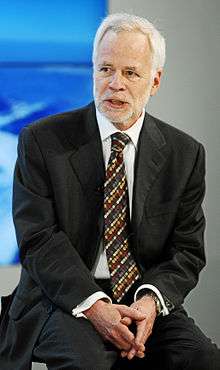Barry Eichengreen
| Barry Eichengreen | |
|---|---|
 | |
| Born |
1952 (age 63–64) United States |
| Nationality | American |
| Institution | University of California, Berkeley |
| Field | Political economics, economic history |
| Alma mater |
Yale University University of California, Santa Cruz |
| Influenced | Marcel Fratzscher |
| Information at IDEAS / RePEc | |
Barry Eichengreen (born 1952) is an American economist[1] who holds the title of George C. Pardee and Helen N. Pardee Professor of Economics and Political Science at the University of California, Berkeley, where he has taught since 1987.[2] Eichengreen's mother is Lucille Eichengreen, a Holocaust survivor and author.
He has done research and published widely on the history and current operation of the international monetary and financial system. He received his BA from UC Santa Cruz and his Ph.D. from Yale University in 1979. He was a senior policy advisor to the International Monetary Fund in 1997 and 1998, although he has since been critical of the IMF.
His best known work is the book Golden Fetters: The Gold Standard and the Great Depression, 1919–1939, Oxford University Press, 1992. In his own book on the Great Depression, Ben Bernanke summarized Eichengreen's thesis as follows:
... [T]he proximate cause of the world depression was a structurally flawed and poorly managed international gold standard... For a variety of reasons, including among others a desire of the Federal Reserve to curb the US stock market boom, monetary policy in several major countries turned contractionary in the late 1920's—a contraction that was transmitted worldwide by the gold standard. What was initially a mild deflationary process began to snowball when the banking and currency crises of 1931 instigated an international "scramble for gold". Sterilization of gold inflows by surplus countries [the USA and France], substitution of gold for foreign exchange reserves, and runs on commercial banks all led to increases in the gold backing of money, and consequently to sharp unintended declines in national money supplies. Monetary contractions in turn were strongly associated with falling prices, output and employment. Effective international cooperation could in principle have permitted a worldwide monetary expansion despite gold standard constraints, but disputes over World War I reparations and war debts, and the insularity and inexperience of the Federal Reserve, among other factors, prevented this outcome. As a result, individual countries were able to escape the deflationary vortex only by unilaterally abandoning the gold standard and re-establishing domestic monetary stability, a process that dragged on in a halting and uncoordinated manner until France and the other Gold Bloc countries finally left gold in 1936.
The main evidence Eichengreen adduces in support of this view is the fact that countries that abandoned the gold standard earlier saw their economies recover more quickly.
His recent books include Global Imbalances and the Lessons of Bretton Woods, MIT Press, September 2006, The European Economy Since 1945: Co-ordinated Capitalism and Beyond, Princeton University Press 2007, and Exorbitant Privilege: The Rise and Fall of the Dollar and the Future of the International Monetary System, Oxford University Press, 2011 Web Site
His most recent work is Hall of Mirrors: The Great Depression, The Great Recession, Oxford University Press, December 2014
He has been President of the Economic History Association (2010–2011).
Publications
- Elusive Stability: Essays in the History of International Finance 1919–1939. Cambridge University Press, 1990 ISBN 0-521-36538-4
- Golden Fetters: The Gold Standard and the Great Depression, 1919–1939. Oxford University Press, 1992, ISBN 0-19-510113-8
- International Monetary Arrangements for the 21st Century. Brookings Institution Press, 1994, ISBN 0-8157-2276-1
- Reconstructing Europe's Trade and Payments: The European Payments Union. University of Michigan Press, 1994, ISBN 0-472-10528-0
- Globalizing Capital: A History of the International Monetary System. Princeton University Press, 1996, ISBN 0-691-02880-X; 2. Auflage ebd. 2008, ISBN 0-691-13937-7
- Vom Goldstandard zum EURO. Die Geschichte des internationalen Währungssystems. Wagenbach, Berlin 2000, ISBN 3-8031-3603-2
- European Monetary Unification: Theory, Practice, Analysis. The MIT Press, 1997 ISBN 0-262-05054-4
- with José De Gregorio, Takatoshi Ito & Charles Wyplosz: An Independent and Accountable IMF. Centre for Economic Policy Research, 1999, ISBN 1-898128-45-6
- Toward A New International Financial Architecture: A Practical Post-Asia Agenda. Institute for International Economics, 1999, ISBN 0-88132-270-9
- Financial Crises and What to Do About Them. Oxford University Press, 2002, ISBN 0-19-925743-4
- with Erik Berglöf, Gérard Roland, Guido Tabellini & Charles Wyplosz: Built to Last: A Political Architecture for Europe. CEPR, 2003, ISBN 1-898128-64-2
- Capital Flows and Crises. The MIT Press, 2004, ISBN 0-262-55059-8
- Global Imbalances and the Lessons of Bretton Woods. The MIT Press, 2006, ISBN 0-262-05084-6
- The European Economy Since 1945: Co-ordinated Capitalism and Beyond. Princeton University Press, 2008, ISBN 0-691-13848-6
- Exorbitant Privilege, Oxford University Press, New York 2010 ISBN 978-0-19-975378-9
- Hall of Mirrors: The Great Depression, The Great Recession, and the Uses-and Misuses-of History, Oxford University Press, New York 2015 ISBN 978-0-19-939200-1
References
- ↑ "World Economic Crises:Barry Eichengreen". Congressional Testimony – via Highbeam (subscription required) . 14 September 1998. Retrieved 1 February 2015.
- ↑ "Barry Eichengreen, University Of Pennsylvania". Analyst Wire – via Highbeam (subscription required) . 8 April 2011. Retrieved 1 February 2015.
External links
| Wikiquote has quotations related to: Barry Eichengreen |
- Barry Eichengreen at the University of California at Berkeley
- Column archive at Project Syndicate
- Column archive at The Guardian
- Barry Eichengreen at The Economist
- Barry Eichengreen at East Asia Forum
- Appearances on C-SPAN
- Works by or about Barry Eichengreen in libraries (WorldCat catalog)
- Barry Eichengreen in the Editorial Board of Financial History Review
- The Use and Abuse of Monetary History, April 2013 – A guest commentary about the US Federal Reserve System and the European Central Bank's monetary policies. at CFO Insight
- Roberts, Russ (June 6, 2011). "Eichengreen on the Dollar and International Finance". EconTalk. Library of Economics and Liberty.